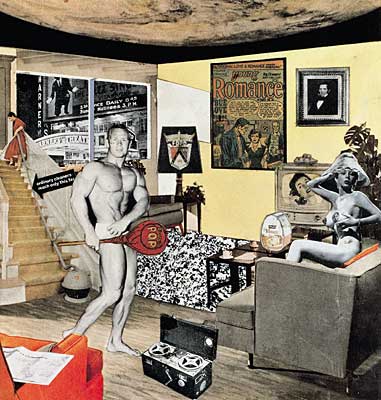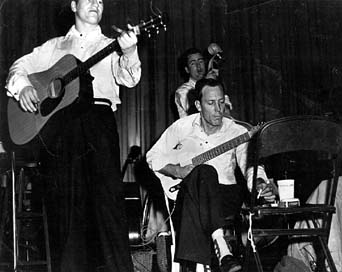
Johnny Burnette and the Rock and Roll Trio, The Train Kept a-Rollin'.
Johnny Burnette and the Rock and Roll Trio, Honey Hush.
Johnny Burnette and the Rock and Roll Trio, Lonesome Tears in My Eyes.
It is a mild Friday night in Evansville, Indiana, in October 1956, and the policemen stationed at the West Side Fall Festival, having expected a quiet night, are now apprehensive.
The trouble starts as soon as the trio of young men take the stage, the last act of the night. The word is that they're from Memphis, that they used to hang out with Elvis ("Buncha greasers!" one boy calls out from the crowd). On stage, the leader, a skinny kid with lanky brown hair, stares out at the two thousand faces. It doesn't look like a sympathetic crowd--there's lots of girls, sure, but plenty of rough-looking boys, farm kids from up in Boonville, roughnecks who drove in from Chrisney smelling of trouble.
The singer, Johnny Burnette, grips the microphone, twists a peg on his guitar, and then, with a barely perceptible nod to the guitarist on his left, launches into the first song.
"COME ON IN THIS HOUSE--STOP ALLTHAT YAKKETY YAK!" And at once, as if fulfilling a compact they made hours earlier, the crowd begins to howl and sway. "HONEY HUSH!" Teenage girls, who make up the majority, start wailing, shrieking, flailing about. The band, now hardly able to hear themselves, drives on through their set. During "Rock Billy Boogie," someone hurls a tomato on stage; a boot gets tossed up during "Blue Suede Shoes"; "Tear It Up" brings on a rain of carnival debris--cotton candy sticks, hot dog wrappers, wet wads of paper. With each song, the sense of communal madness grows: a sense, the band can feel, the cops can feel, of things loosening, cracking apart. The bassist, his brother Dorsey Burnette, is hardly able to hear the two guitars in the maelstrom of noise, and searches his brother's face for a clue. Dorsey dodges a hurled apple and barely can make out what Johnny calls to him. "Train Kept a Rollin'!"
"Train Kept a-Rollin'" is rock & roll at its most fearsome and brutal--it sounds like an old hobo song sung by a madman, with a break in the middle for the lead guitarist, Paul Burlison, to wreak holy hell on his strings. Normally, the sound Burlison generates--a bitter fuzzed tone--is enough to take listeners by surprise, but it's subsumed by the crowd noise tonight. When the singer begins screaming "I caught! a train! I met! a dame!" the response is a howl somehow louder and harsher than before; the frenzy bequeaths itself to a higher frenzy.
The train kept a rollin...ALL NIGHT LONG
the train kept a rollin..ALL NIGHT LONG
The crowd hurls it back at them: "All night long!" "All night long!" By this point, the cops begin to surround the stage, sensing the last hinge is going. On stage, Johnny thinks for a second. Should they just end the set? His brother stares back at him, ready to vault off the stage in a second. But, casting fate to the wind, Johnny calls for "Hound Dog."
A mistake. As soon as he gets out the first lines, as soon as some in the crowd grasp that he's doing "Hound Dog," it begins. Girls hurl themselves against the stage, cops are knocking back middle-class teenagers who, for the first time in their lives, are rioting. It's mass delinquency, pitched at a level no one here has seen before. "Hound Dog" breaks off, Johnny throws his guitar down, pulls off his coat and runs for the trailer behind the stage.
The crowd isn't done with him. They pour around the stage, circling the roadster the singer drove up in. When Johnny emerges from the trailer, flanked by cops as though he's Senator Jenner, the girls rush him. Two get good gripholds on his shirt and, with adrenaline strength, yank it off him. It's a victory, now shared by ten or twelve other girls, who begin shredding the shirt to pieces. Johnny, utterly scared now, is running for his car. The cops are stunned--that girl, the one screaming and twining a slice of shirt-sleeve in her hands, she works at the A&P; a town selectman's son is trying to rip the bumper of Burnette's car.
At last, the trio manage to drive off, leaving the madness behind them to dissipate into legend. When a reporter corners him later, Johnny Burnette, still stunned by it all, makes a crack: "I shoulda laid off that last 'Hound Dog'."

The short-lived Rock and Roll Trio consisted of Johnny Burnette, his older brother Dorsey and the brilliant guitarist Paul Burlison. Dorsey and Johnny were born in Memphis in 1932 and 1934, respectively, and went to high school with Elvis, as well as working with him at the Crown Electric Co. The brothers, after getting nowhere trying to be professional boxers, formed a group with Burlison in 1955 and auditioned for Sam Phillips.
Phillips turned them down--perhaps because he was busy grooming Carl Perkins to replace Presley as his label's top talent. The Trio instead wound up getting signed to Coral, a Decca subsidiary that would become Buddy Holly's home the next year. In Nashville, over the course of a beer-fueled Fourth of July weekend, the Trio recorded most of their essential tracks. (Things only slowed down when a Catholic priest wandered into the session.)
"Train Kept a Rollin", one of the best rock & roll songs ever made, was taped on July 2, 1956, "Honey Hush" (a Big Joe Turner cover) a day later. They were issued together as Coral 61719. In addition to the Trio, Farris Coursey played drums. Details here.
Not all the Burnettes' tracks were as frenetic as "Train" and "Honey". One of their lovelier pop songs is "Lonesome Tears in My Eyes," also recorded on July 3. It was a favorite of the Beatles, who recorded it for the BBC's "Pop Go the Beatles" radio show, just as their fame in the UK was reaching fever pitch. Lennon's vocal is a bit smoother than Johnny Burnette's, but otherwise it's a pretty straightforward cover (the Beatles do add a little pseudo-Latin rhythm). The recording, from July 10, 1963, is on Live at the BBC.
The Trio were kaput by 1957--Burlison got tired of music and quit, and the Burnettes went out to Los Angeles to become pro songwriters, writing for Ricky Nelson and others. Johnny Burnette reinvented himself as a teen idol, getting massive hits in 1960 with "You're Sixteen" and "Dreamin'" and died in a boating accident four years later. Dorsey eventually became a country singer until his death in 1979. All their great tracks can be found on Rock 'N Roll Trio/Tear It Up.
Top painting: Richard Hamilton, Just What Is It That Makes Today's Homes So Different, So Appealing?, 1956.
Bonus no-prize trivia question: what links this painting to the movie Caddyshack? Put answers in comments.
On our summer hours
The next post will wrap up '56 in our usual overindulgent way, and then?
Well, it's summertime (a time which, if last year was any precedent, readership falls off anyhow).
So get ready for another of a series of "theme" posts, which will take up a good bit, if not all, of the hot months. The series should start next week, maybe. And it will be doled out slowly. A post every two weeks--maybe. More likely, every three weeks.
I need the break, folks. Simple as that. So enjoy the snail-paced series of posts this summer and take some time off yourselves.
Those who only crave the "year by year" format should look for 1957 to start around Labor Day. See you then.
No comments:
Post a Comment